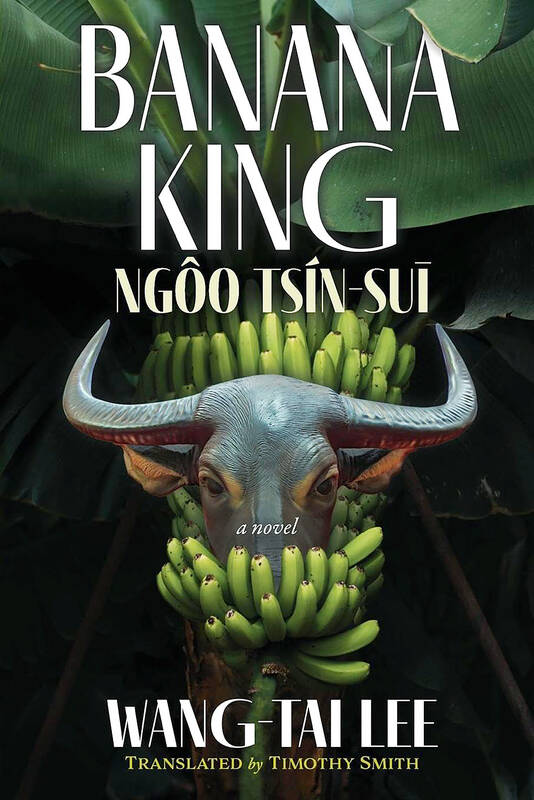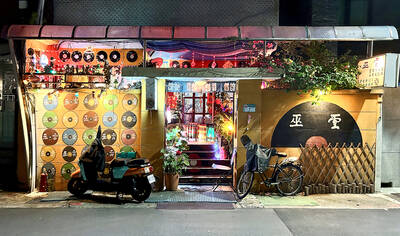The Chinese Nationalist Party’s (KMT) five-decade authoritarian rule of Taiwan was so rife with injustice that it’s hard to capture how bad things could get. Several works get close: George H. Kerr’s Formosa Betrayed and Elegy of Sweet Potatoes by Tehpen Tsai (蔡德本), for example.
More recently, Facing the Calamity by Fred Him-San Chin (陳欽生), who was brutally tortured into a false confession and then imprisoned for 12 years, has exposed the relentless grind of a KMT state security apparatus, which crushed up and spit out individuals who happened to be in the wrong place at the wrong time (and many who weren’t.) Anyone seeking to understand the kinds of things that could happen once someone was caught in the jaws of the machine should visit Jing-Mei White Terror Memorial Park (白色恐怖景美紀念園區), where Chin offers tours based on his experience in the former prison grounds where he was held.
This fictionalized but, in its fundamentals, strongly fact-based account of a long-forgotten figure from postwar Taiwan’s fruit industry is worthy of shelf space alongside such works.

BANANA MAGGOT
The story of Ngoo Tsin-sui’s metamorphosis from “Banana King” to “Banana Maggot,” stage-managed by senior officials who met defiance of their orders and the associated loss of face with merciless retribution, is shocking and deeply moving.
In an afterword, translator Timothy Smith notes that working on the book “made my blood boil at certain parts and left me in a depressed stupor at others.” Foremost among the distressing images is that of Iap Tshiu-bok (葉秋木), a Pingtung city councilor and childhood friend of Ngoo’s who is horrifically mutilated before being loaded on the back of a truck and executed in a public square during the 228 crackdown. Should any reader feel the scene is overdone, the original Chinese actually toned down the historical details, Smith reveals.
The incident sparks a psychosomatic response in Ngoo, sending streaks of pain pulsating down his spine and throughout his body — a phenomenon that continues throughout his life whenever he is faces some new trauma (invariably brought about by another injustice.) And while Ngoo might not have suffered extreme physical mistreatment, following his incarceration, he notes that the mental and emotional toll were “much more horrendous…”
GOLDEN BOWL BRIBES
The narrative follows Ngoo, known in Mandarin as Wu Chen-jui (吳振瑞), from humble beginnings as a headstrong teen ejected from his family home in rural Pingtung County, through his experience as a technician in a Japanese banana research station, and ultimately to the chairmanship of the Kaohsiung Green Fruits Export Association.
Along the way, he shows intelligence, charisma and a magical way with his beloved water buffalo, who symbolize the burden and resilience of the Taiwanese. The naive obstinacy that enraged his father is another facet of his personality and one that frequently leads him to the brink of disaster. While his colleagues, friends and family — and even those who, like the sneaky Garrison Command informant Ouyang, conspire in his undoing — admire his integrity, they often urge restraint.
Among those who believe the KMT regime is a chronic disease to be endured is Ngoo’s best friend Tong Tsuan-tsong, son of a steel magnate who has long advocated currying favor with party top brass. Having already been shaken down for a fortune, Tong Tsuang-tsong’s father Tong Ing (唐榮) invites then-vice president and premier Chen Cheng (陳誠) to the inauguration of his factory’s expanded premises.
As one sardonic bystander at the ceremony observes, Tong Senior is content to “hold Chen Cheng’s family jewels for him,” while Tong Junior bears the grimace of a man who is doing so with reluctance and disgust. Yet, with a heavy heart, he eventually follows his father’s advice, urging Ngoo to do the same. Even then, Tong Tsuan-tsong sees his business confiscated for alleged financial malpractice. Where others see the futility of resistance, Ngoo is an optimist with faith in the basic reason and decency of humanity. Alas, he is frequently disappointed on both counts. Yet at times Ngoo tries to confirm, ingratiating himself with the appropriate bigwigs, only to back the wrong horse. In this regard, the power struggle between “the prince” Chiang Ching-kuo (蔣經國), and “the empress” Soong Mei-ling (宋美齡), looms large as a backdrop to the novel’s events.
When things do go wrong, it is implied that it is then-minister of economic affairs Li Kwoh-ting (李國鼎) that pulls the rug out from under Ngoo’s feet. Having incurred Li’s wrath for ignoring his demand to sign up to an “unequal treaty” with a US firm, Ngoo is arrested and forced to confess to trumped up charges stemming from “awards” of golden bowls to officials in recognition of their “service” to banana farmers.
The irony of these “donations” — exorbitant bribes paid to various KMT front organizations — being later used to condemn the extorted parties, is obvious. In this way, the regime cultivated political patronage and kept big business on a leash. Individuals such as Li, who had an unblemished reputation in the West as Taiwan’s “godfather of technology,” may not have been on the take, but would not hesitate to destroy anyone undermining the bedrock of the system. Both the “Golden Bowl Incident” and the Tong Ing debacle were the subject of previous works of non-fiction, upon which author Lee Wang-tai (李旺台) relied for key details in this novel. The miscarriage of justice against Ngoo was revealed in the 2016 Chinese-language work The Banana Man: Wu Chen-jui and the Golden Bowl Case (金蕉傳奇:香蕉大王吳振瑞與金碗案的故事) by historian Huang Hsu-chu (黃旭初), which was published by the Pingtung County Government.
POLITICAL PROSE
While it’s always hard to judge prose in translation, there are some lovely touches in this novel from Lee, a former journalist. The passages dealing with Ngoo’s interactions with buffalo contain some of his finest writing. One example is an allegorical conversation between Ngoo and his father over the dangers of gambling. For the revelation that horse racing was a popular sport during the colonial era alone, the exchange is notable. But the discussion of the differences between buffalo and horses catches the attention.
“Buffalo can recognize themselves, recognize life, take things in their stride. All their movements are slow and deliberate, but they have patience and strength,” says Ngoo. While horses are also powerful, they manifest this through speed, Ngoo notes.
Interrupting, Ngoo’s father points out: “Horse[s] aren’t animals that we Taiwanese originally had…”
Praise is also due for Smith’s endeavors on the translation. A long-time resident of Taiwan, who is proficient in both Mandarin and Hoklo (commonly known as Taiwanese), Smith had to work with Lee’s use of sometimes nonstandard Taigi Hanji — the rendering of Taiwanese through Chinese characters. Ditto the more sparing uses of Chinese characters to convey Hakka speech.
The conveyance of Taiwanese and Japanese idioms, culturally specific terminology and even onomatopoeic exclamations — the ubiquitous, disapprobatory honnh — is deftly achieved through a combination of repetition, extensive notes and — most impressively — context. There is the odd inconsistency with romanization and a couple of eye-catching errors — former President Yen Chia-kan (嚴家淦), who was premier when the Golden Bowl scandal broke, is referred to as Yen Chia-chin a couple of times. None of this detracts from the power of novel that captures the spirit of Taiwan and Taiwanese of all strata during a key transition in the country’s contemporary history.

The Lee (李) family migrated to Taiwan in trickles many decades ago. Born in Myanmar, they are ethnically Chinese and their first language is Yunnanese, from China’s Yunnan Province. Today, they run a cozy little restaurant in Taipei’s student stomping ground, near National Taiwan University (NTU), serving up a daily pre-selected menu that pays homage to their blended Yunnan-Burmese heritage, where lemongrass and curry leaves sit beside century egg and pickled woodear mushrooms. Wu Yun (巫雲) is more akin to a family home that has set up tables and chairs and welcomed strangers to cozy up and share a meal

Dec. 8 to Dec. 14 Chang-Lee Te-ho (張李德和) had her father’s words etched into stone as her personal motto: “Even as a woman, you should master at least one art.” She went on to excel in seven — classical poetry, lyrical poetry, calligraphy, painting, music, chess and embroidery — and was also a respected educator, charity organizer and provincial assemblywoman. Among her many monikers was “Poetry Mother” (詩媽). While her father Lee Chao-yuan’s (李昭元) phrasing reflected the social norms of the 1890s, it was relatively progressive for the time. He personally taught Chang-Lee the Chinese classics until she entered public

Last week writer Wei Lingling (魏玲靈) unloaded a remarkably conventional pro-China column in the Wall Street Journal (“From Bush’s Rebuke to Trump’s Whisper: Navigating a Geopolitical Flashpoint,” Dec 2, 2025). Wei alleged that in a phone call, US President Donald Trump advised Japanese Prime Minister Sanae Takaichi not to provoke the People’s Republic of China (PRC) over Taiwan. Wei’s claim was categorically denied by Japanese government sources. Trump’s call to Takaichi, Wei said, was just like the moment in 2003 when former US president George Bush stood next to former Chinese premier Wen Jia-bao (溫家寶) and criticized former president Chen

President William Lai (賴清德) has proposed a NT$1.25 trillion (US$40 billion) special eight-year budget that intends to bolster Taiwan’s national defense, with a “T-Dome” plan to create “an unassailable Taiwan, safeguarded by innovation and technology” as its centerpiece. This is an interesting test for the Chinese Nationalist Party (KMT), and how they handle it will likely provide some answers as to where the party currently stands. Naturally, the Lai administration and his Democratic Progressive Party (DPP) are for it, as are the Americans. The Chinese Communist Party (CCP) is not. The interests and agendas of those three are clear, but